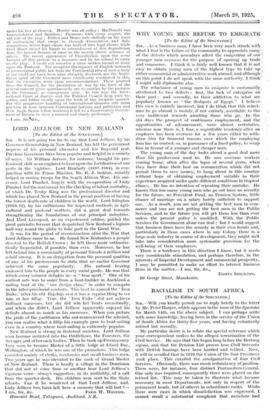WHY YOUNG MEN REFUSE TO EMIGRATE
[To the Editor of the SPECTATOR.] SIR,—As a business man, I have been very much struck with what I fear is the failure of the community to appreciate many of the defects which nowadays affect the emigration of our younger men overseas for the purpose of opening up trade and commerce. I think it is fairly well known that it is not easy to obtain young men of the highest type to take up either commercial or administrative work abroad, and although on this point I do not speak with the same authority, I think i might add diplomatic also.
The reluctance of young men to emigrate is customarily1 attributed to two defects : first, the lack bf enterprise on
their part ; and secondly, to their addiction to what are popularly known as the fleshpots of Egypt." I believe this view is entirely incorrect, but I do think that this reluct- ance to go abroad is mainly, if not entirely, ascribable to the very indifferent rewards awaiting those who go. In the old days the prospect of continuous employment, and the opportunities of advancement, were almost certainties, whereas now there is, I fear, a regrettable tendency after an employee has been overseas for a few years either to with- draw him for financial reasons over which the employing firm has no control, or, in pursuance of a fixed policy, to scrap him in favour of a younger and cheaper man.
The young man of the day looks ahead a good deal more
than his predecessor used to. He sees overseas workers coming home, often after the lapse of several years, when they have done their best on remuneration which did not permit them to save money, to hang about in this country without hope of obtaining employment suitable to their experience acquired under quite different conditions in tropical climes. He has no intention of repeating their mistake. He knows that too many young men who go out have no security for the future, no Provident Fund, no Pension System, little chance of marriage on a salary barely sufficient to support one. As a result, you are not getting the best men in com- merce and you are not getting the best men in the Public Services, and in the future you will get them less than ever unless the present policy is modified. With the Public Services the Government alone can deal ; but I would suggest that business firms have the remedy in their own hands and, particularly in those cases where in any Colony there is a large-scale industry in course of development, they might well take into consideration more systematic provision for the well-being of their employees.
There is a tendency in this direction I know, but it needs very considerable stimulation, and perhaps therefore, in the interests of Imperial Development and commercial prosperity, I may be permitted to make an effort to interest business firms in the matter.—I am, Sir, &e.,
EDWIN STOCKTON'.
90 George Street, Manchester.














































 Previous page
Previous page